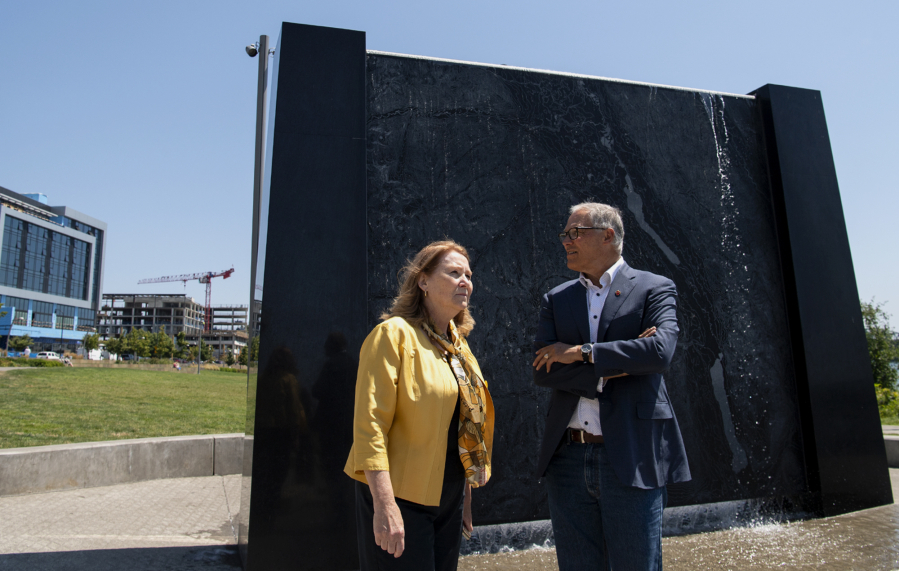Small-business owners gathered Tuesday afternoon for a conversation with Gov. Jay Inslee, who visited Clark County to discuss pandemic recovery and tour the city’s new waterfront development.
Representatives from several local businesses gathered at Vancouver City Hall for the event, coordinated with the Greater Vancouver Chamber of Commerce and the Hispanic Metropolitan Chamber.
“You have been very courageous and innovative and persistent,” Inslee said. “I recognize how difficult this year has been for you, but I’m also very optimistic about your operations, especially in this area.”
During the roundtable, more than a dozen owners recounted their experience navigating through the COVID-19 pandemic as well as the new challenges that come with emerging from the widespread restrictions.
A few themes emerged. Many of the proprietors reported struggling with finding or retaining staff.
Katrina and Clinton Roberts, who together own non-emergency medical transport company Golden Chariot, said they’ve had a problem with people applying for open positions — ostensibly to meet the legal requirement that state unemployment recipients prove that they’re looking for work — only to ghost them during the interview.
“It’s 95 percent. Probably a little bit more,” Katrina Roberts said.
Elizabeth Gomez, owner of Bridge City Contracting, told the governor that she lost employees during the pandemic because they had to take care of their children when schools shut down.
“It’s just been a really crappy year for us,” Gomez said. “We’re trying to get back into our groove and get back into the swing of things.”
Owners also reported struggling with various types of red tape, including ever-evolving guidance from the governor’s office and new climate regulations.
Gomez pointed to the new updates to the Washington State Energy Code, which were implemented in March and aimed at combating climate change. The revisions are making it harder for her to secure the products and materials she needs to successfully complete a job within a reasonable period of time, she said.
“I agree with (the code) wholeheartedly, it’s just not the time for the rollout to happen. The supply chain is backed up,” Gomez said. “It’s driving prices up, because we can’t keep up with the demand.”
Inslee responded that he hoped his office could work with Gomez to try and find the source of the delays and price hikes. The problem is much broader than just the change to the state’s energy code, he added.
“Every person I talk to says, ‘my supply chain is broken,’ ” Inslee said. “The supply chain is just so far behind the demand, because the supply chain shrunk, obviously, during COVID, and then all the sudden we had that demand spike — all the sudden, a year and a half’s worth of pent-up demand.”
Bryan Shull, owner of Trap Door Brewing on Main Street, said that the changing guidance from the governor’s office left him scrambling to keep up for much of the last year. He often felt like his concerns ultimately went unheard, he added.
“We were bouncing like a pinball machine,” Shull said. Some of the requirements, like a stipulation that restaurants and bars use CO2 monitors to help measure air circulation, felt “arbitrary,” he said.
In his response, Inslee said that the push-and-pull between trying to provide a stable business environment while still responding nimbly to changes in COVID transmission rates proved one of the toughest parts of steering through the pandemic.
“We’ve never been hit by COVID before. All of us had to make decisions that we had never made before, we had to try new technologies like CO2 meters,” Inslee said. “But we had to save lives. So we had to go and try a lot of things that were new to us.”
The conversation also laid bare the crucial role that state and federal small-business assistance played in bridging the gap through the worst of the pandemic. Each of the owners who participated in Tuesday’s roundtable made it through the last year, but nearly all of them relied on some combination of Small Business Administration loans, Paycheck Protection Program payouts, the Washington Small Business Emergency Grant program or private donor programs like the All In WA grants.
Washington paid out around $240 million to small businesses in state assistance alone, Inslee said.
The governor’s roundtable discussion followed a tour of The Waterfront Vancouver development. Along with Vancouver Mayor Anne McEnerny-Ogle, wife Trudi Inslee, and a small delegation of local and state leaders, Inslee ate lunch at WildFin American Grill before taking a stroll through Waterfront Park, popping into Maryhill Winery Vancouver Tasting Room and Kafiex Roasters for a cup of coffee.
He also walked across Grant Street Pier for the first time, and got his shoes wet in the park fountain that mimics the topography of the Columbia River Basin.
Prior to his Vancouver visit, Inslee toured the waterfront near the Port of Camas-Washougal Tuesday morning.




